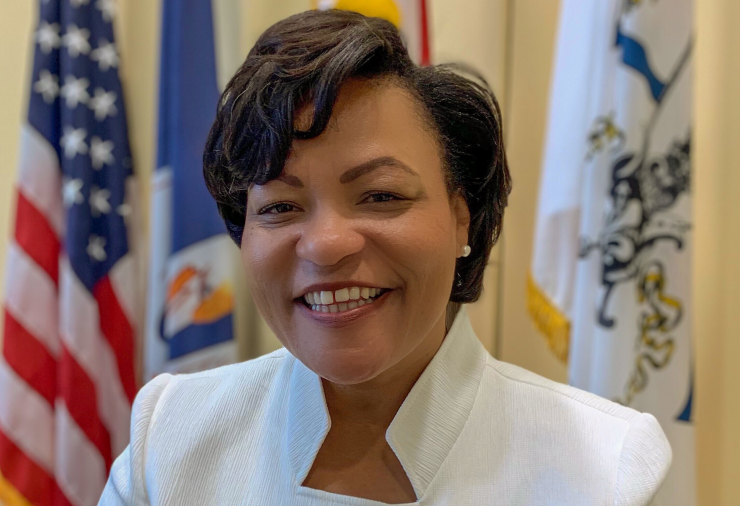New Orleans plans to borrow money to help close a budget gap caused by the city's response to the COVID-19 pandemic, which has caused lost revenue from tourism and events, business closings and stay-at-home orders.
The City Council Thursday approved Mayor LaToya Cantrell's request to use a newly created emergency financing application to request that the Louisiana State Bond Commission authorize the issuance of up to $100 million of 15-year revenue notes to fund operations and pay expenses. The debt would be secured by ad valorem taxes.

While property taxes have been collected for the year, the city anticipates a shortfall of $130 million or more in the collection of sales taxes, fines and forfeitures, according to
The city, which so far has spent $20 million responding to the novel coronavirus, has implemented freezes on hiring and spending, and anticipates getting a portion of the $1.8 billion received by the state from the CARES Act.
The "significant economic damage" due to the pandemic and shutdown of vital tourism sector led Fitch Ratings to cut New Orleans' issuer default rating to A from A-plus on Monday.
The downgrade to A also applies to $307.7 million of general obligation and public improvement bonds issued by the city and the Board of Liquidation; $145.3 million 2012 taxable limited tax refunding bonds; $10.4 million Audubon Commission 2011A-1 aquarium tax bonds; and $7.7 million in 2014 drainage system refunding bonds.
All bond ratings are on watch negative, Fitch said.
"Louisiana, and New Orleans in particular, has recorded a significant number of COVID infections, hospitalizations, and deaths in recent weeks," said Fitch analyst Steve Murray. "The shutdown is producing a sharp reduction in economically sensitive revenues, and the possibility of an extended period of recovery in tourism suggests a weaker revenue trend in coming months.
"This revenue pressure will require actions by the city to maintain recently bolstered reserves at a satisfactory level, including spending reductions and infusion of other revenues either through government assistance programs or external borrowings, or both," he added.
Mayor Cantrell declined to comment on Fitch's downgrade.
On May 1, S&P Global Ratings changed the city’s rating outlook to negative from positive, while affirming its AA-minus rating on the GO bonds.
Moody's Investors Service maintains an A2 rating on the city's unlimited and limited tax GOs bonds. The outlook is stable.
Chief Administrative Officer Gilbert Montaño told the council Thursday that the city projects having $31 million in its rainy day fund by the end of the fiscal year on Dec. 31. Another $18 million to $22 million is also expected to be available via fund balance.
"We will have a leaner and most certainly smaller government as we move forward in this pandemic," he said.
As of Thursday, hard hit Orleans Parish, which includes New Orleans, had seen 6,626 positive cases of the disease and 463 deaths. Statewide, Louisiana reported 30,652 positive cases and 2,135 deaths.
PFM Financial Advisors LLC and CLB Porter LLC are co-municipal advisors to the city. Foley & Judell LLP and Auzenne & Associates LLC are co-bond counsel.
In addition to the COVID-19 outbreak, New Orleans has incurred extraordinary expenditures from two unanticipated events.
On Dec. 13, the city was hit by a cyber attack. It took more than a month to stop the malware from spreading and many computers had to be replaced. According to the recent budget presentation, the attack is expected to cost $7.5 million, of which $4.4 million has been spent or encumbered.
On Oct. 12, the top floors of the 18-story New Orleans Hard Rock Hotel at 1031 Canal Street collapsed while under construction, killing three workers and injuring a dozen others. The bodies of two workers remain today in the unstable structure, which hasn't been demolished because companies involved in the project and the city couldn't agree how to take it down, until recently.
The collapse required the city to reroute buses and take other protective measures, which have cost an estimated $11.66 million to date. On Tuesday, The city issued an emergency order to demolish three buildings adjacent to the site to pave the way for the safe demolition of the hotel.
While the city deals with these events, Louisiana remains under stay-at-home orders preventing some businesses from reopening.
Gov. John Bel Edwards extended the statewide stay-at-home order to May 15 from April 30. Edwards, a Democrat, said he took the action to continue to slow the spread of the virus because new positive cases, deaths and hospitalizations remained high in some, but not all, regions of the state.
Some members of the Republican-led Legislature say they believe Edwards' is being overly restrictive. On Wednesday, the House Governmental Affairs Committee voted 9-7 for a measure that would prevent Edwards from penalizing businesses that fail to comply with his order.





